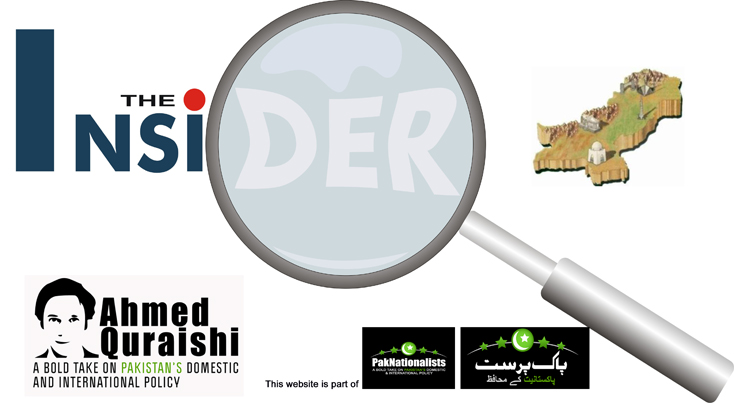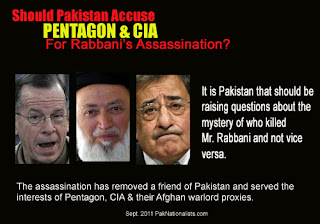Should
Pakistan Accuse Pentagon And CIA Of Murdering Rabbani?
Ironically, the assassination
removed a friend of Pakistan and served the interests of Pentagon, CIA and
their Afghan allies. While avoiding confrontation, Pakistan needs to speak up
and not let disinformation dominate the air waves. Here are key points that
weaken American propaganda.
AHMED
QURAISHI | Monday | 26
September 2011
PakNationalists.com
PakNationalists.com
ISLAMABAD, Pakistan—There
is a reason why the United States has ignored the cold-blooded murder of
ex-Afghan president Burhanuddin Rabbani and focused all its energies instead on
the attacks on US embassy and NATO offices in Kabul.
The assassination
neatly fits in with the interests of three parties: US military, CIA and their
Afghan warlord allies. It might well be the first planned murder of a senior
Afghan government official opposed to US meddling in Afghan reconciliation.
This is the work of
the same American lobbies opposed to President Barrack Obama’s Afghan pullout plan
and his defense budget cuts.
There is no credible
confirmation yet on who exactly eliminated the man who served as President
Karzai’s key manager of reconciliation with Afghan Taliban and someone who recently
converted into a friend of Pakistan.
After the
assassination, the United States military and intelligence tried to create a
wedge between Kabul and Islamabad by invoking an alleged Pakistani hand. But
this was effectively countered by Pakistani officials, who have become accustomed
to American games. Prime Minister Yousaf Raza Gilani’s quick dash to Kabul to
offer condolences and support and later army chief’s cool and calm response to
Leon Panetta and Mike Mullen’s anti-Pakistan outbursts helped counter the
attempt to poison Karzai’s newfound understandings with Islamabad.
Rabbani’s murder
removed an advocate of bringing Afghan Taliban into government, and blaming Pakistan
for his murder built pressure on Karzai to sever ties with Islamabad. Such a
move would have destroyed Pakistan’s strategy of working closely with Karzai –
and Rabbani – to reach a deal with Afghan Taliban and re-empower the Pashtuns despite
American opposition.
In short, it is
Pakistan that should be raising questions about the mystery of who killed Mr.
Rabbani and not vice versa.
The only party that
was well prepared to make the most out of Rabbani’s murder was Pentagon and
CIA. Both of them moved quickly on two fronts: domestic politics and Pakistan.
Domestically, the Panetta-Mullen duo organized a joint anti-Pakistan briefing
on 22 September and later Mullen appeared before US Senate armed services
committee.
The domestic
objectives of Pentagon and CIA from this anti-Pakistan campaign are:
1.
Save the skin of US military and intelligence
officials responsible for security lapses in Afghanistan
2.
Dodge accountability
3.
Send a message that major cuts in defense
budget won’t be acceptable, and
4.
Underline that Afghanistan continues to require
foreign military and intelligence presence
Afghanistan today is
CIA’s largest base of operations anywhere in the world. The agency is loath to
abandon an outpost that gives it direct access to the backyards of several
strategic nations at once: Iran, Pakistan, China and Russia. No sane strategist
would let go of such an opportunity. Mr. Rabbani’s peace mission may not have
shown initial signs of success but it had already upset the policy direction
favored by US military, intelligence and their Afghan warlord allies. India was
also skeptical about the Rabbani-Karzai plans. Ending the isolation and
punishment of the Pakhtun and incorporating them into Afghan power structure
has never appealed to these parties. Another common denominator among these
parties is their expressed anti-Pakistanism.
In fact, whoever
assassinated Mr. Rabbani was also aiming at ensuring that Afghanistan remains
an anti-Pakistan outpost. Islamabad has advocated ending the policy of
isolating the Pashtun and worked hard to convince Mr. Karzai that friendship
and respect for the legitimate interests of both Afghanistan and Pakistan is in
both nations’ interests and would benefit stability in the region. Mr. Rabbani
had made several overtures to Pakistan in recent months. In January he used the
platform of Geo television to address Pakistanis. He spoke in Urdu as a special
gesture.
PAKISTAN’S RESPONSE
Pakistan is pursuing
the right policy with regards to American provocations. What is lacking in this
policy is the media edge. For example, several Pakistani officials have sent
strong direct and indirect messages to Washington recently. The list includes
the Prime Minister, Foreign Minister, Interior Minister, Chief of Army Staff
and ISI director. But Pakistan faces a sweeping campaign of demonizing the
country. This American policy continues since 2004. Both political and military
establishments have failed to counter the American narrative. The danger in the
massive American campaign is that it paves the way for stronger future actions
and limits global support for Pakistani positions. An example is the intense
propagandist reporting on Iraq’s WMD in 2002 which helped Washington invade
that country on fake evidence.
We need to become
more overt in questioning US positions with regards to several key issues. This
includes:
1.
CIA support and safe havens for terrorists
meddling in Balochistan
2.
TTP’s easy access to US weapons
3.
The freedom of movement granted to
anti-Pakistan terrorists inside US-controlled Afghan territory
4.
The intense demonization of Pakistan primarily
and largely in mainstream US media as part of an unstated American policy
5.
Transforming US-controlled Afghanistan into a
hub for anti-Pakistan forces in the region
6.
Meddling in Pakistani politics
7.
Buying out Pakistani media and planting
mouthpieces in print and TV.
We should also
review the argument that we can’t abandon America’s war on terror to ensure US
aid flow and to fight domestic extremism. Washington will keep Pakistan afloat
but will continue to drag its feet on key strategic issues such as energy
generation and access for Pakistani textiles to US market. The US won’t sign
any written agreements on CIA’s illegal activities inside Pakistani territory
and airspace. As for domestic extremism, apart from TTP terror group that is
linked to the Afghan mess, all other forms of domestic extremism are an
internal Pakistani issue and should be delinked from America’s Afghan war.
All of this
strengthens the argument that we need to declare an end to our direct
participation in America’s Afghan war, known as the war on terror. Bilateral
Pak-US cooperation to find an end solution in Afghanistan can continue. The
move will give us a chance to redesign our relations with Washington and get
rid of the verbal commitments made earlier.
Verbatim
copying and distribution of this entire article is permitted in any medium
without
royalty provided this notice is preserved.



